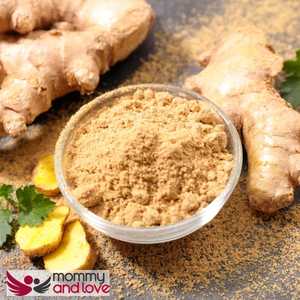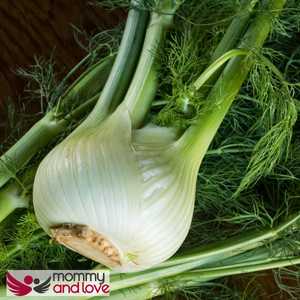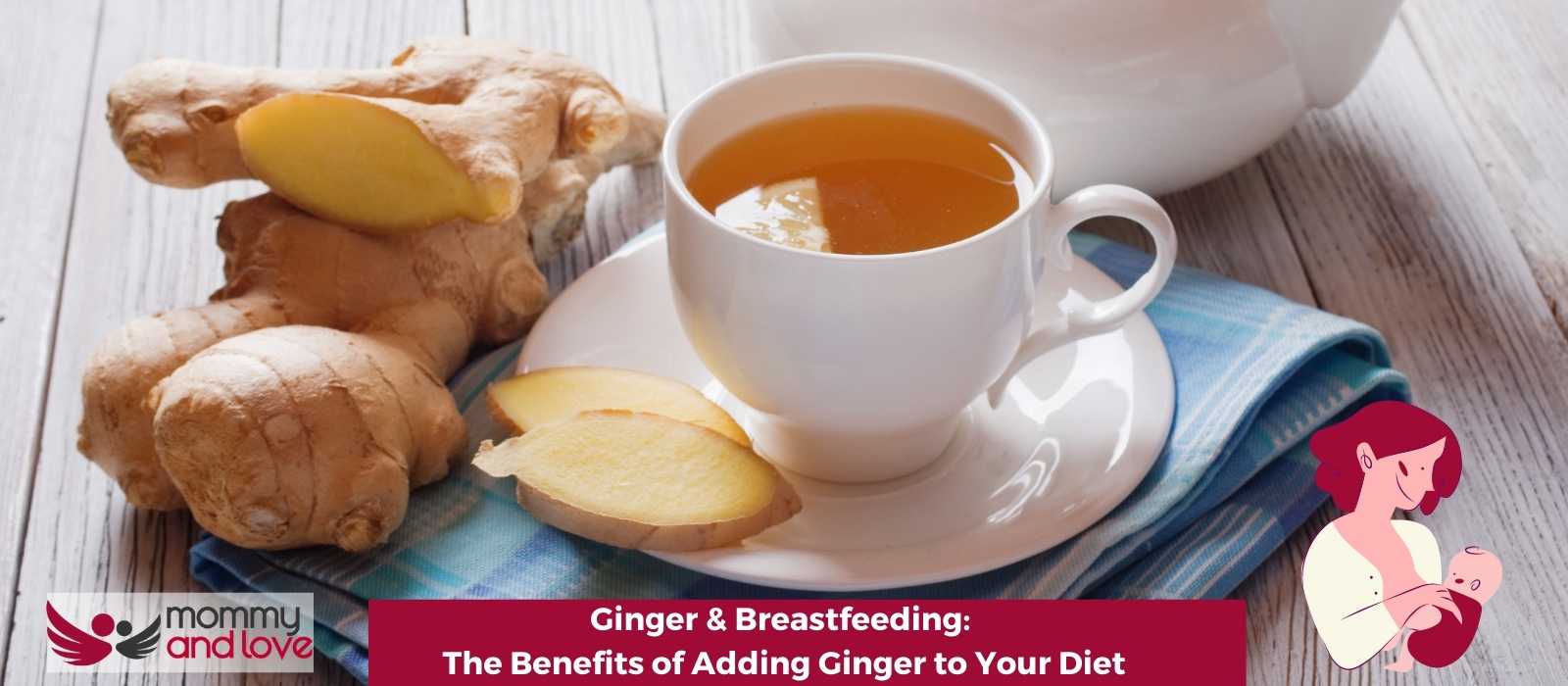Some breastfeeding moms may be looking for ways to improve their milk supply. One way to do this is by adding ginger to your diet. Ginger has many benefits, including boosting the production of breast milk.
In this blog post, we will discuss the benefits of ginger for breastfeeding moms and provide some tips on how to add it to your diet.
What Are the Benefits of Ginger?

Ginger is a versatile root with many health benefits. Many Asian and Middle Eastern cultures use ginger as a traditional home remedy to relieve nasal congestion, and motion sickness, ease a sore throat, reduce nausea and help with digestion. It is also believed to help strengthen the immune system.
Here are other benefits of ginger that go beyond breastfeeding:
Nausea
Ginger is a popular home remedy for nausea, vomiting and morning sickness. Some people take it in pill form, while others drink ginger tea or chew on fresh ginger root.
There are several studies that suggest that ginger may help to relieve nausea and vomiting. One study found that taking ginger capsules was just as effective as taking the anti-nausea medication metoclopramide.
Ginger is thought to work by stimulating the digestive system and helping to relieve stomach cramps. It may also help to reduce inflammation in the gut.
Pain
Ginger is a root that has long been used to help relieve pain. It is most commonly used to help with menstrual cramps and muscle pains. Ginger works by helping to relax the muscles and reduce inflammation. It also helps to increase blood flow and reduce cramping.
Digestion
Ginger is a well-known natural remedy for digestion problems and abdominal discomfort. It can help with gas and diarrhea. It can also help relieve constipation and bloating.
Ginger contains compounds that relax the smooth muscles of the gastrointestinal tract. This helps to speed up digestion and prevent constipation. Ginger also has anti-inflammatory properties that can help to reduce bloating.
If you are experiencing digestion problems, try adding ginger to your diet. You can add fresh ginger to your food or drink, or take a supplement. Ginger is generally recognized as safe for most people, but it can cause heartburn and other side effects in some people.
Circulation
Ginger is a natural blood thinner. It can help improve circulation by thinning the blood and reducing cholesterol levels. This, in turn, helps improve blood flow throughout the body.
Additionally, ginger can help to reduce blood pressure by relaxing the muscles in the walls of blood vessels. All of these factors together make ginger an effective way to improve circulation and blood flow.
For breastfeeding women who are looking to improve their circulation, ginger is a great place to start. Add it to your diet in any way you can – fresh, powdered, or as a supplement. You’ll soon see the benefits!
Safety Precautions When Taking Ginger While Breastfeeding
Ginger is a popular spice with many health benefits, but it also comes with some risks. When consumed in large amounts, ginger can be dangerous to breastfeeding mothers.
Here are some warnings and contraindications that breastfeeding mothers that need to keep in mind before consuming ginger.
- Although ginger in fresh form is generally safe, there are a few potential side effects to be aware of. These include upset stomach, gas, and diarrhea. If you experience any of these side effects after consuming ginger, don’t consume ginger.
- As with any herbal remedy and medicinal herbs, it is important for a nursing mother to speak with her healthcare provider before you consume ginger while breastfeeding as it could affect postpartum recovery. This is particularly important if the breastfeeding mother has a history of significant blood loss during the early postpartum period.
- Ginger can interact with certain medications, including blood thinners, heart disease, and diabetes medication. If you are taking a breastfeed med, it’s important to speak with your baby’s doctor before consuming ginger.
- Ginger can also cause heartburn and indigestion in some people. If you have a history of these conditions, you should be cautious when consuming ginger.
- Pregnant women should avoid consuming large amounts of ginger. Ginger can cause contractions and bleeding, which can be dangerous for both the mother and baby. If you are pregnant, it’s best to speak with your doctor before consuming ginger.
- Some people don’t realize that they have an allergy to ginger until they take it in large quantities. Most babies are not allergic to it either. If you’re allergic to ginger, you may experience a rash or other skin irritation. If you have an allergy to ginger, don’t take it in supplement form.
Does Ginger Affect Breast Milk Supply?
As a galactagogue, ginger is thought to increase breast milk production. Although there is no scientific evidence to support this claim, many women report that consuming ginger helps them increase milk supply.
If you’re looking for a natural way to boost your breast milk production, consider adding ginger to your diet. However, be sure to speak with your healthcare provider before making any changes to your diet during breastfeeding.
Dietary supplements are not highly recommended for nursing moms. And even if the medicinal herb supplements are approved by the US Food and Drug Administration, you should still take the necessary precautions before taking them.
Is Ginger Tea Safe While Breastfeeding?
Yes, generally speaking, ginger tea is considered safe while breastfeeding. However, as with any herbal tea, it’s always best to check with your healthcare provider before drinking it. This is especially true if you are taking any medications, as ginger can interact with some drugs.
That said, drinking ginger tea while breastfeeding is generally considered safe. In fact, ginger has been traditionally used to help with nausea and vomiting. So if you’re feeling a bit queasy, drinking ginger tea may help alleviate some of your symptoms.
We’ve done a detailed guide to the best lactation teas to drink when nursing.
How to Make Ginger Tea
Ingredients:
- gingerroot
- water
- honey (optional)
Instructions:
Peel and slice the ginger root. Bring water to a boil and add a few slices of ginger. Allow the ginger tea to steep for about five minutes. Remove the thin slices and sweeten with honey, if desired.
How to Add Ginger to Your Diet
Ginger Root
If you want to add fresh or raw ginger root to your diet, there are a few ways to do so. One way is to add food flavoring to dishes like stir-fries or curries. You can also grate it into soups, stews or salad dressing. Another way to enjoy ginger root is in baked goods like cookies and bread.
Just remember to start with a small amount and increase it gradually, as ginger can be quite potent.
Ginger Ale
Ginger ale is a caffeine-free soft drink that is often consumed in moderation. You can enjoy it even if you don’t like to drink alcohol.
It is made with real ginger, and sometimes other natural flavors like lemon or lime. While it’s not as popular as some other sodas, ginger ale has been around for centuries and is enjoyed by people all over the world.
When buying ginger ale, choose the one with real ginger not the one with artificial ginger flavoring. Be careful when drinking soda when nursing.
Ginger Supplements
If you do decide to take ginger supplements while breastfeeding, be sure to choose powdered or dried herbal supplements made by a reputable company.
As always, consult with your lactation consultant before starting any new supplement while breastfeeding. They can help you determine the best way to incorporate ginger supplements into your breastfeeding routine.
Ginger Tea
In moderation, drinking ginger tea can be a great way to relax and ease any discomfort you may be feeling. If you do decide to drink ginger tea while breastfeeding, be sure to listen to your body’s cues. Too much ginger can lead to heartburn or other gastrointestinal issues.
Does Ginger Affect the Taste of Breast Milk?
As with other food, the strong flavor and odor of ginger may affect the taste of breast milk of nursing mothers. Some breastfeeding mothers report that their babies refuse to nurse after eating ginger, while others say that it doesn’t seem to make a difference.
If you’re concerned about how ginger might affect your breast milk, try pumping and taste-testing the milk yourself before giving it to your baby. If you notice a strong ginger flavor, you can always mix the mothers milk with formula or water to dilute it.
And if your baby refuses to breastfeed after you introduced ginger to your diet, stop it for a while and just add it back in later.
What Other Herbs to Take if You Don’t Like the Taste of Ginger?

If you’re looking for other herb alternatives to ginger as lactation foods, try fenugreek, blessed thistles, or fennel.
Fenugreek is a spice commonly used in Indian cooking that has a slightly sweet taste.
Blessed thistle is an herb that’s often used to make teas and has a bitter taste.
Fennel is another herb that has a sweet taste and is often used in cooking. Read our guide to fennel for nursing moms.
All three of these herbs have medicinal properties and can be found at most health food stores. Give them a try and see which one you like best!
Take Away on Can You Have Ginger While Breastfeeding
If you’re a breastfeeding mom and are looking for a natural way to help with nausea or increase your breast milk supply, ginger is an herb that may be worth considering.
The strong flavor of ginger can often overpower other flavors in your food or drinks, so it’s important to start small when adding the herb into your diet.
And if you have any questions regarding the safety of ginger while breast feeding, you can always talk to a medical professional or lactation consultant.

This article was written by Sandra Baker – full time writer and the mother of four amazing kids (including twins!)
She’s also a breastfeeding counselor and has spent years helping new parents learn how to care for their children. When she’s not writing or caring for her children, Sandra likes to spend time reading and taking walks with her husband.




